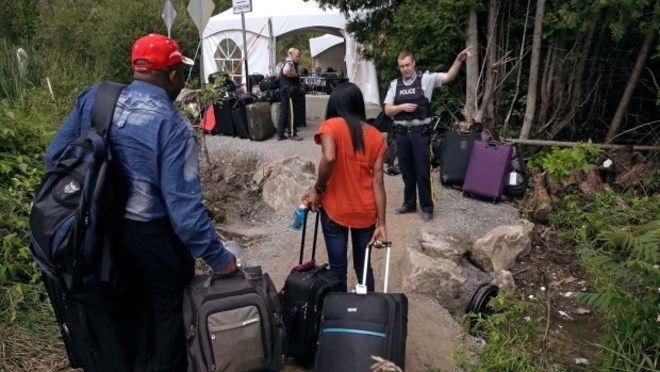
Friday October 13, 2017
 An RCMP officer speaks to people as they cross the border into Canada at Roxham Road in Hemmingford, Que., earlier this year. The RCMP created an interview guide for officers handling the asylum seekers. (Charles Krupa/Associated Press)
An RCMP officer speaks to people as they cross the border into Canada at Roxham Road in Hemmingford, Que., earlier this year. The RCMP created an interview guide for officers handling the asylum seekers. (Charles Krupa/Associated Press)
An RCMP interview guide used to screen asylum seekers on their prayer habits and views on women who don't wear the hijab was "inappropriate" and "wrong-headed," Public Safety Minister Ralph Goodale says.
The three-page form, obtained by CBC News, asked people who were trying to cross the Quebec-U.S. border on Roxham Road, a busy crossing east of Hemmingford, Que., for details on their work history, whether they had a criminal record and what motivated their decision to leave the United States.
It also asked for their views on female bosses, terrorist attacks and ISIS.
Muslims in particular appear to have been targeted, as no other religion is mentioned in the questionnaire.
Goodale said the questions amounted to religious profiling and the RCMP has suspended the use of that version of the interview guide, which was deployed at Roxham Road and a processing centre at the Saint-Bernard-de-Lacolle border crossing.
"As soon as they were drawn to our attention, which was during the course of the day on Tuesday, we immediately contacted the headquarters of the RCMP to determine what exactly what was going on," Goodale said Thursday.
"These questions were not appropriate. They were developed at the local level but they were immediately withdrawn, and the RCMP is now examining how this decision-making took place so they can make sure it does not take place in the future," he said.
Goodale said any data collected as a result of the questions will be traced and expunged.
Roxham Road was the site of a major influx in asylum seekers this summer. Thousands used the road to cross and make a refugee claim in Canada.
The existence of the RCMP guide was first reported by the Toronto Star.
'Preliminary risk assessments'
In an emailed response, RCMP Cpl. Annie Delisle said the interview guide was created by a Quebec division of the police service in response to "the high volume of irregular migrants" in order to conduct streamlined "preliminary risk assessments."v
The information is kept in an RCMP database, she said, and shared with Canada Border Services Agency and other partners "in accordance with Canadian legislation."
She did not specify what legislation.
The interview guide, which the RCMP started using in the spring, has since "been revised to better evaluate individuals coming into the country whose origin is unknown, while being respectful of their situations," she said.
'Utterly irrelevant,' lawyer says
Toronto lawyer Clifford McCarten, who obtained a copy of the document after it was mistakenly handed to one of his clients, said it's "entirely appropriate" for the Canada Border Services Agency to ask probing questions about criminality and whether border crossers are associated with extremist groups.
But, he said, "I've never seen someone asked how regularly they practise their religion, what their opinion on having a woman as a boss is, or their views of different religious coverings. And the reason I've never seen that is because it's utterly irrelevant, from a legal point of view, to the refugee claims process."
McCarten said he's "shocked to hear that there is no apparent federal oversight about the way that screening was going on" at what has become Canada's busiest processing centre for asylum seekers.
Values test?
Mitchell Goldberg, president of the Canadian Association of Refugee Lawyers, said the interview guide "smacks of a values test" like the one proposed by failed Conservative leadership candidate Kellie Leitch.
"You expect the RCMP to be concerned about our security, about Canadians' safety, not asking people questions about their religion and their politics," he told CBC Montreal's Daybreak.
"It's the kind of thing we'd expect on the other side of the border, in the United States."
Samer Majzoub, president of the Canadian Muslim Forum, said authorities shouldn't be targeting asylum seekers because of their religious or cultural background.
"It was very shocking, honestly," he said.
"One of the things that was really surprising was that it was many social questions, not so much security questions."